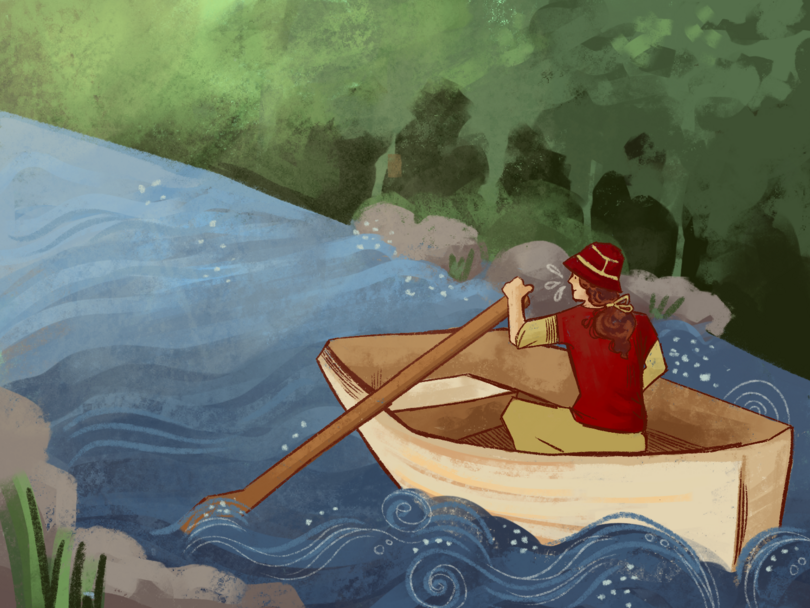Personal Essay: Prioritize healthy reactions, not frustration with others

College years bring cyclical routines that feel normal yet self-centered, our essayist writes. Students must acknowledge the possibility of disruptions to others’ lives before making assumptions, she emphasizes. Hannah Mesa | Illustration Editor
Get the latest Syracuse news delivered right to your inbox.
Subscribe to our newsletter here.
As November neared and leaves changed from green to orange, I found myself feeling stuck in the same cyclical routine. I couldn’t stop thinking about David Foster Wallace’s “This is Water” commencement speech at the end of my senior year, especially now that I’m experiencing what I’ve been told are the most important and transformative years of my life.
I reached out to my teacher, and we messaged back and forth about what Wallace emphasized as the freedom of real education. It describes that an education doesn’t provide you the capacity to think, but rather teaches you about your agency in those thoughts. He labels this notion as being “well-adjusted” – having to decide what has meaning and what doesn’t.
Wallace begins his address with a parable: two young fish swim along when they meet an older fish, who greets them and says, “Morning, boys. How’s the water?” They swim on and, eventually, one turns to the other and asks, “What the hell is water?”
Every day, I wake up, dreading my 8 a.m. class, with only enough time to chug an energy drink before rushing out the door. As I head out, I curse the elevator because it’s old and faulty, and because students on other floors are waiting for it too, which just slows me down from getting where I need to be.
Then, I try my best to pay attention to a monotonous, hour-and-a-half-long lecture, agitated by the people behind me who keep whispering a bit too loudly about their weekend. In the afternoon, I go to the gym, which is packed because it’s midday and everyone else also just finished classes.
As the day winds down, I finish assignments, study for exams, go to work and finally return to my dorm, exhausted. Then, I wake up the next morning only to do it over again. It’s a sequence of events we know all too well.
It isn’t easy to go against our default setting of selfishness.Gain Lim, Essayist
But this way of thinking is nothing but close-mindedness, a kind of blind certainty that’s been hardwired into us since birth. In fact, Wallace states it “amounts to an imprisonment so total that the prisoner doesn’t even know he’s locked up.”
It’s natural and easy to think in such an arrogant and conceited manner – it’s our default setting. After all, we view the world as it happens to us: we intrinsically believe we’re at the center of the universe.
But the reality is quite the opposite. My professor wakes up hours earlier than I do to prepare material for the day. The student waiting for the elevator has an emergency to tend to – they’re in a much bigger hurry than I am – really, I’m in their way, as Wallace describes. The people whispering behind me do so to keep themselves awake because they stayed up the night before studying for a big exam. The people at the gym also want to simply get in and get out, because this was the only time they could fit a workout into their schedule.
These things may not seem likely, but they are also not impossible.
If I make the conscious effort to consider the possibility that everyone around me also has immediate and real needs, I change a frustrating situation into one that’s meaningful and sacred – one that’s built on fellowship and community.
We can’t control anything in this confusing and exasperating world, but we can control how we respond. It isn’t easy to go against our default setting of selfishness. Sometimes, I won’t be able to or simply won’t want to. But more often than not, I’m aware enough to give myself a choice.
That’s the freedom of real education – to be “conscious and aware enough to choose what you pay attention to and to choose how you construct meaning from experience.” So the next time you wonder, “What the hell is water?” This is it – this is water.
The most obvious realities are often the most difficult to see. We tend to worry ourselves with what the water is rather than actually seeing and properly acknowledging it. The boredom, routines and repetitions may remain our reality, but we can make much more of it than passive participation. Until we learn to respond and react with the consideration of others, we’re giving up the chance for more positive experiences.
Gain Lim is a freshman majoring in Health & Exercise Science. She can be reached at glim06@syr.edu






